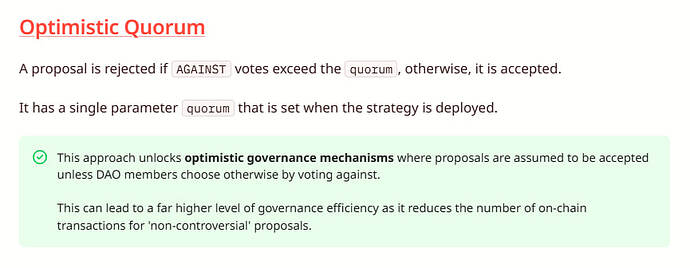Introduction
The Metis Governance team is committed to fostering decentralization while ensuring that we continue to grow as a thriving and inclusive ecosystem. As part of this commitment, we are proposing a shift from a Simple Quorum system to an Optimistic Quorum system for Community Ecosystem Governance (CEG) votes. That includes:
- Ecosystem Proposals
- Governance Proposals
- Emergency Proposals
This change will not affect Sequencer and LST Proposals.
Proposal
We propose modifying the quorum structure for Proposals mentioned above as follows:
- Current Simple Quorum: A proposal is accepted if FOR votes exceed AGAINST votes, and the total votes (FOR + AGAINST + ABSTAIN) exceed the quorum.
- Proposed Optimistic Quorum: A proposal is rejected only if AGAINST votes exceed the quorum (5,000 METIS). Otherwise, it is accepted.
This means that proposals will be approved by default unless the community actively votes against them with a strong enough consensus. The 5 day vote period gives the community time to review, conduct research, and identify any potential risks or red flags.
From Snapshot docs :
In the case of a failed vote (more than 5,000 METIS AGAINST), there will be a second and final chance through a revote. The revote will use quadratic voting to ensure a fairer distribution of influence and will require a Simple Quorum of 5,000 METIS and 400 participating wallets.
Motivation
- Simplifying Governance Participation – The current quorum requirements can be difficult to reach, slowing down ecosystem growth. This adjustment makes governance more efficient and scalable.
- Encouraging More Projects – A lower barrier to entry enables more projects to start building in Metis, bringing more innovation and adoption.
- Empowering the Community – This approach shifts governance focus to active participation in rejecting projects that do not align with Metis’ vision rather than needing to rally votes for approval.
- Aligning with Decentralization – Governance should be structured to empower the ecosystem, not restrict it. By optimizing quorum mechanics, we remove unnecessary roadblocks while keeping safety mechanisms in place.
Course of Action
- Proposal Posting on the Forum: Introduce the change to the community, allowing for open discussion and feedback.
- Community Discussion & Refinement: Collect feedback, address concerns, and refine the implementation details if needed.
- Implementation & Monitoring: If no strong objections, apply the new quorum rules and assess their impact over time, making adjustments as necessary.
Conclusion
As the Governance team, it is our responsibility to adapt and refine processes that further decentralization while ensuring Metis continues to grow and attract quality projects. This proposal balances accessibility and security, ensuring governance supports the Metis ecosystem rather than slows it down.
Questions to the Community
What are your thoughts on moving to an Optimistic Quorum system? What do you like about it (or not) and why?
What other changes would you suggest?
Is the proposed quorum of 5,000 METIS AGAINST insufficient, over calculated or fair?
Your input is essential! We invite the community to share their thoughts and help shape the next evolution of Metis Governance.
